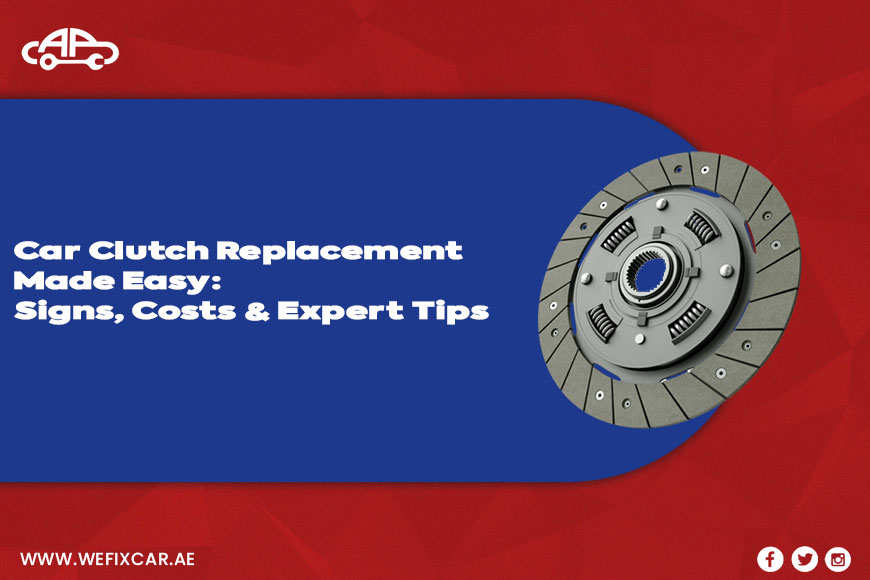Car Clutch Replacement Made Easy: Signs, Costs & Expert Tips
Introduction
The clutch may not be the flashiest component in your car, but it’s one of the most essential. It connects your engine to your transmission, allowing you to change gears smoothly. When it begins to wear out, your driving experience can turn from smooth to stressful fast. That’s where understanding car clutch replacement becomes crucial.
In this guide, we’ll cover everything from identifying signs of clutch wear to understanding costs and expert tips for maintaining it like a pro.
What Is a Car Clutch?
The clutch is a mechanical device that connects and disconnects the power flow between the engine and the wheels. Simply put, it helps you shift gears by temporarily cutting off the power from the engine to the transmission.
Key Components of a Clutch System
- Clutch Disc: Engages and disengages power.
- Pressure Plate: Maintains contact between the disc and flywheel.
- Release Bearing: Enables smooth movement when pressing the clutch pedal.
- Flywheel: Stores rotational energy from the engine.
How Does a Clutch Work?
When you press the clutch pedal, it disengages the engine’s power, allowing you to change gears. Releasing it re-engages power to the wheels. It’s like a handshake between your engine and your gearbox firm, smooth, and perfectly timed.
Common Signs You Need a Car Clutch Replacement
Your clutch doesn’t fail overnight. It gives warning signs if you know how to spot them.
1. Slipping Clutch
If the engine revs but the car doesn’t accelerate as expected, your clutch may be slipping.
2. Difficulty Shifting Gears
Hard gear changes or grinding noises are red flags.
3. Burning Smell
A burnt smell while driving, especially uphill, signals clutch friction issues.
4. Spongy or Stiff Pedal
Changes in pedal feel indicate hydraulic or cable issues.
5. Strange Noises
Squealing or rattling sounds can point to a worn-out clutch bearing.
Why Ignoring Clutch Problems Can Be Costly
Delaying car clutch replacement can lead to:
- Transmission damage
- Increased fuel consumption
- Higher repair bills later
- Reduced control over your vehicle
Think of it as ignoring a toothache it only gets worse (and more expensive).
How to Confirm If Your Clutch Needs Replacement
You can perform a simple test:
- Engage the handbrake.
- Start the engine.
- Put the car in third gear.
- Slowly release the clutch while applying a little throttle.
If the engine doesn’t stall, your clutch is likely slipping. Still, it’s best to visit a mechanic for a proper inspection.
Average Cost of Car Clutch Replacement
The average clutch replacement cost ranges from $400 to $1,500, depending on your car model and labor rates. Luxury vehicles can cost even more, often exceeding $2,000.
Cost Breakdown
- Parts: $200–$600
- Labor: $300–$900
Factors That Influence Clutch Replacement Cost
Several things affect how much you’ll pay:
- Car Make & Model: Sports and luxury cars cost more.
- Transmission Type: Manual clutches are cheaper than dual-clutch systems.
- Labor Charges: Vary by location and mechanic expertise.
How Long Does a Clutch Last?
A clutch typically lasts between 50,000 and 100,000 miles, depending on driving style and maintenance. Aggressive driving or frequent city traffic can shorten its lifespan.
DIY vs Professional Clutch Replacement
DIY Replacement
If you’re mechanically skilled, you might be tempted to do it yourself. However, clutch replacement requires special tools and precision one wrong step can damage your transmission.
Professional Replacement
Hiring a certified mechanic ensures the job is done right, with proper alignment and safety checks.
Expert Tips to Extend Clutch Life
- Avoid resting your foot on the clutch pedal.
- Don’t use the clutch to hold the car on slopes use the handbrake instead.
- Schedule regular maintenance and inspections.
- Replace clutch fluid as per manufacturer guidelines.
Common Myths About Car Clutch Replacement
| Myth | Fact |
| “Only manual cars have clutches.” | Automatic cars also use clutch systems they’re just automated. |
| “You can drive with a slipping clutch indefinitely.” | Doing so risks severe transmission damage. |
| “Replacing a clutch is always expensive.” | Early diagnosis and local mechanics can lower costs significantly. |
Choosing the Right Mechanic or Service Center
Before handing over your car, check:
- Reviews and certifications
- Warranty on replacement parts
- Transparent pricing policies
A reliable clutch repair specialist won’t hesitate to explain what they’re fixing and why.
Preventive Maintenance for Clutch Health
Make it a habit to:
- Check clutch fluid levels monthly
- Schedule routine inspections
- Avoid aggressive gear changes
- Keep your car well-tuned
Consistent care can save you from unexpected breakdowns and costly repairs.
Read Blog : How Much Should You Pay for Bumper Repair in UAE? | Complete Cost Guide 2025
Conclusion
Your clutch is a silent hero working tirelessly every time you drive. Recognizing the early signs of wear and addressing them promptly can save you money and ensure your car runs smoothly for years. Whether you choose a DIY fix or professional help, understanding car clutch replacement empowers you to make smarter, safer driving decisions.
FAQs
1. How often should I replace my car clutch?
Usually every 50,000–100,000 miles, but it depends on driving habits and vehicle type.
2. Can I drive with a bad clutch?
Technically yes, but it’s unsafe and can cause further damage to your transmission.
3. How long does clutch replacement take?
Typically 3–6 hours, depending on the vehicle and mechanic’s expertise.
4. Is clutch replacement covered under warranty?
It depends on your car’s warranty policy wear-and-tear parts are usually not covered.
5. What’s the best way to make a clutch last longer?
Avoid clutch riding, maintain proper gear usage, and schedule regular inspections.



